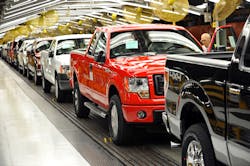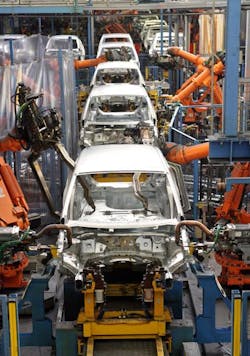Are fuel economy standards the linchpin of the light vehicle industry?
A new report commissioned by the nonprofit organization Ceres argues that national fuel economy and emissions standards can help increase the viability and international competitiveness of domestic light vehicle manufacturers and suppliers – and may be critical to sustaining innovation and their fiscal health as well.
“Our analysis suggests that investors remain skeptical of automakers as sales decline from peak levels, as well as their ability to adapt to new options in personal mobility,” said Alan Baum, author of the report and founder and principal of Baum and Associates. “Innovation, especially in fuel efficiency and electric vehicles, will be key to thriving in this new world.”
Ceres’ report – entitled What’s Driving the U.S Auto Industry’s Financial Performance – states that so-called “legacy automakers” are experiencing low stock valuations and cutting jobs and expenses largely due to two factors.
The first is that overall demand for passenger cars and trucks is declining modestly, according to the report – with pent-up demand from the “Great Recession” of 2007 to 2009, alongside record 2015 and 2016 sales, now largely satisfied.
U.S. vehicle sales set a record in 2016, totaling 17.55 million units, which beat the previous record set only a year before that in 2015, when sales hit 17.47 million, according to Autodata Corp. That made 2016 the seventh consecutive year of year-over-year sales gains, an unprecedented string, noted consulting firm IHS Markit.
Yet the National Automobile Dealers Assn. expects U.S. sales to drop to 17.1 million vehicles in 2017 as interest rates and vehicle prices rise.Even so, current auto sales and profits remain strong and, more importantly for the future, innovation and market disruption will become major factors, according to the Ceres report.
“New technology innovations and business models, namely from Tesla and Uber, as well as deep-pocketed competitors such as Google and Apple, are entering the automotive and emerging mobility markets,” noted Baum. “Given the importance of operating costs and the synergy between autonomous vehicles and electrification, fuel efficiency and electrification will be key to succeeding in this fast-evolving marketplace.”
That’s where the importance of fuel economy standards comes into play, noted Carol Lee Rawn, transportation program director at Ceres, in the report. They provide automakers and suppliers the regulatory certainty necessary to stimulate investment in advanced technologies, such as electric vehicles and fuel efficient vehicles, necessary for automakers’ long-term financial health.
“Fuel economy standards drive innovation in the advanced technologies that will enable the domestic industry to thrive in this era of disruption,” Rawn said. “The standards also act as an insurance policy, providing an incentive for the auto industry to produce a more advanced fleet. A more efficient fleet reduces the risk of lost market share and profits in the event that fuel prices spike.”
In 1985, Ceres noted that more than two-thirds of the “Detroit Three” unit sales (the “Detroit Three” being Ford Motor Co., General Motors, and Chrysler) were in North America.
But by 2025, the Ceres report projects that only one-third will be sold in North America, while two-thirds of sales will be overseas. And in those markets, governments require — and consumers demand —more fuel-efficient vehicles.
For example, China, the largest car market, recently announced a goal of 40% of sales in 2030 will be “New Energy” vehicles, encompassing“Given the major trends affecting the industry going forward, weakening the current fuel economy standards would in fact be detrimental to the future competitiveness of U.S. automakers and their suppliers,” Baum added.
He pointed out that several dozen global “Tier One” suppliers – which operate hundreds of facilities across the U.S. – are also reacting to fuel economy mandates by pouring resources into research and development, adding production capacity, and issuing purchase orders to hundreds of their suppliers.
That increased demand for suppliers will lead to higher volumes and cost savings that will improve the financial performance of both automakers and their suppliers, according to the report.
“Since automotive suppliers, which employ two and a half times more Americans than auto manufacturers, have made the bulk of investments in research, development and production of fuel-saving technologies, regulatory certainty is extremely important for suppliers and the employees and communities that depend on them,” Baum stressed.
Over the 12-year period between 2014 and 2025, with the 2025 fuel economy and emissions standards in place, all automakers – not just the Detroit Three – will spend well over $110 billion to develop and build fuel-saving technologies, about $90 billion of which will be provided by suppliers, the Ceres report predicted.
“Nobody likes being told what to do,” Baum emphasized. “But fuel economy standards establish a level playing field and encourage the kind of innovation necessary to survive in a changing world. If the auto industry wants to stay on the leading edge, the standards should be left alone.”
About the Author
Fleet Owner Staff
Our Editorial Team
Kevin Jones, Editorial Director, Commercial Vehicle Group
Cristina Commendatore, Executive Editor
Scott Achelpohl, Managing Editor
Josh Fisher, Senior Editor
Catharine Conway, Digital Editor
Eric Van Egeren, Art Director


